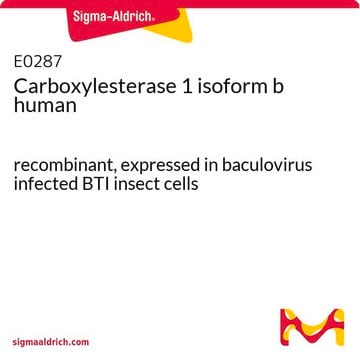C1682
Acetylcholinesterase human
recombinant, expressed in HEK 293 cells, lyophilized powder, ≥1,000 units/mg protein (Lowry)
Synonyme(s) :
AChE, Acetylcholine acetylhydrolase
Se connecterpour consulter vos tarifs contractuels et ceux de votre entreprise/organisme
About This Item
Produits recommandés
Description générale
Acetylcholinesterase (AChE) is a serine hydrolase, which belongs to the carboxyl esterase family of enzymes. AChE is localised at neuromuscular junctions and cholinergic brain synapses.
Application
Acetylcholinesterase human has been used:
- as a standard protein to measure protein levels acetylcholinesterase AChE-R and AChE-S
- to stimulate human fibroblasts
- to study its in vitro catalytic activity and to determine the effects of metals, H2O2 and OH radicals on the activity
Actions biochimiques/physiologiques
Acetylcholinesterase (AChE) is regarded as a biomarker in neurotoxicity. It is a modulator of nitric oxide signal transduction pathway and marker of membrane integrity and aging. AChE, hydrolyzes choline esters. It terminates the impulse transmission at cholinergic synapses. AChE does this by rapid hydrolysis of the neurotransmitter acetylcholine (ACh) to acetate and choline. AChE inhibitors prevent the cholinesterase enzyme from breaking down ACh and increases the level and duration of the neurotransmitter action.
Major degradative enzyme for acetylcholine in vivo. Converts acetylcholine + H2O to choline + acetic acid.
Définition de l'unité
One unit will hydrolyze 1.0 μmole of acetylthiocholine to thiocholine and acetate per minute at pH 8.0 at 37 °C.
Forme physique
This product is supplied as a lyophilized powder. Lyophilized from 0.22 μm filtered solution in 50mM phosphate buffer pH8.
Remarque sur l'analyse
The activity obtained using acetylcholine as substrate is 30-100 times that obtained with butyrylcholine, using acetylcholinesterase from electric eel.
Code de la classe de stockage
11 - Combustible Solids
Classe de danger pour l'eau (WGK)
WGK 3
Point d'éclair (°F)
Not applicable
Point d'éclair (°C)
Not applicable
Certificats d'analyse (COA)
Recherchez un Certificats d'analyse (COA) en saisissant le numéro de lot du produit. Les numéros de lot figurent sur l'étiquette du produit après les mots "Lot" ou "Batch".
Déjà en possession de ce produit ?
Retrouvez la documentation relative aux produits que vous avez récemment achetés dans la Bibliothèque de documents.
Les clients ont également consulté
In vitro effect of H 2 O 2, some transition metals and hydroxyl radical produced via fenton and fenton-like reactions, on the catalytic activity of AChE and the Hydrolysis of ACh
Mendez-Garrido A, et al
Neurochemical Research, 39(11), 2093-2104 (2014)
Different cholinesterase inhibitor effects on CSF cholinesterases in Alzheimer patients
Nordberg A, et al.
Current Alzheimer Research, 6(1), 4-14 (2009)
Sebastian Oddsson et al.
Molecules (Basel, Switzerland), 25(12) (2020-06-26)
Despite extensive efforts in the development of drugs for complex neurodegenerative diseases, treatment often remains challenging or ineffective, and hence new treatment strategies are necessary. One approach is the design of multi-target drugs, which can potentially address the complex nature
Agneta Nordberg et al.
Current Alzheimer research, 6(1), 4-14 (2009-02-10)
The current study aimed to compare the effects of different cholinesterase inhibitors on acetylcholinesterase (AChE) and butyrylcholinesterase (BuChE) activities and protein levels, in the cerebrospinal fluid (CSF) of Alzheimer disease (AD) patients. AD patients aged 50-85 years were randomized to
Acetylcholinesterase from human erythrocytes as a surrogate biomarker of lead induced neurotoxicity
Gupta VK, et al.
Enzyme Research, 2015 (2015)
Notre équipe de scientifiques dispose d'une expérience dans tous les secteurs de la recherche, notamment en sciences de la vie, science des matériaux, synthèse chimique, chromatographie, analyse et dans de nombreux autres domaines..
Contacter notre Service technique



